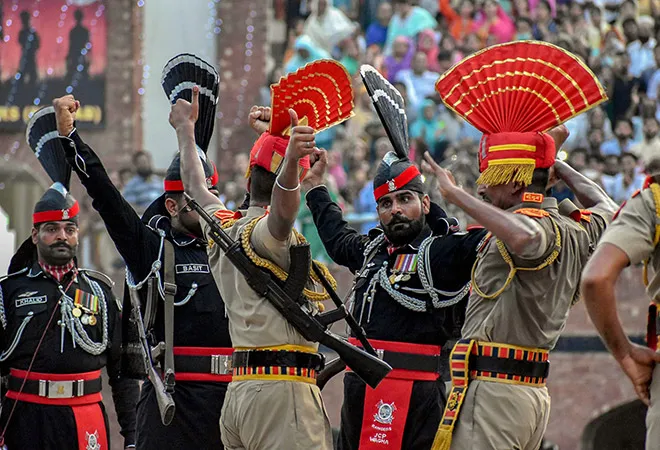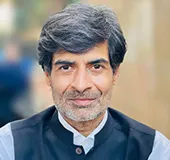 India and Pakistan made some significant overtures since the formation of new government in Islamabad, which rekindled hopes of peaceniks in both the countries. But the parleys proved short-lived. The battle lines are drawn again as accusations and counter-accusations fly thick and fast. This week, the foreign ministers of the two countries took their war of words to the UN General Assembly.
India and Pakistan made some significant overtures since the formation of new government in Islamabad, which rekindled hopes of peaceniks in both the countries. But the parleys proved short-lived. The battle lines are drawn again as accusations and counter-accusations fly thick and fast. This week, the foreign ministers of the two countries took their war of words to the UN General Assembly.
The following is an interview of Samir Saran with the
Tehran Times.
The formation of a new government in Islamabad had rekindled hopes of peace and reconciliation between India and Pakistan, after the two sides made a series of overtures and looked interested in opening a new chapter in their bilateral ties. But, now it has again been put on the backburner. What makes this relationship so fragile?
The relationship remains fragile for structural reasons. Issues of identity and a shared sense of historical animosity have hardcoded themselves into both countries’ politics. And in today’s polarised media environment, opinions on these issues are sharper and more amplified than ever before. These factors make any true reconciliation very difficult.
Imran Khan in his victory speech said he will take two steps if India took one. And Narendra Modi had called to congratulate him on his thumping victory in Pakistan general elections. Do you think the two leaders were really sincere in improving bilateral ties?
No, it is unlikely that they were. This welcoming rhetoric is often visible when new administrations take office, but rarely lasts very long for the reasons outlined in my first response.
Everything seemed to be going as per the script until India called off foreign minister level talks on the side lines of UNGA, citing killing of policemen in Kashmir and release of stamps in Pakistan commemorating a Kashmiri militant commander. Do you think there are shadowy forces working overtime to sabotage peace process?
The Pakistani Army remains a key interlocutor in Pakistan-India relations. Their overwhelming control over most aspects of Pakistan’s political and social life is built on a hardline Islamic identity and hostility towards India. Prospects of peace with India always threaten these realities — and the Army has often attempted to sabotage any attempts at constructive outreach.
Some experts opine that PM Modi decided to call off talks since he doesn't wish to antagonise his loyal Hindu vote bank in India ahead of next year's general election. What is your take on it?
Talks with Pakistan are always politically sensitive in India — irrespective of which party is in power. Having said that, no administration has ever hesitated to take this risk if real and constructive outcomes were on the horizon. At this time, it is evident that there was no such possibility — and any administration in India would have rather called off talks.
Pakistan's foreign minister Shah Mehmood Qureshi speaking at the UN accused India of “financing, facilitating and orchestrating terrorism in Pakistan,” citing the case of Kulbushan Yadav, who he called “Indian state-sponsored terrorist.” How would you react to that?
This is not new rhetoric in Pakistan, nor will it be the last time it is used. It is merely a very weak attempt to delegitimise India’s credible complaints over the extent to which terrorism has been mainstreamed in Pakistan.
The crossborder shelling and ceasefire violations continue unabated. In recent years, the violations of the ceasefire accord the two countries signed in 2003 have assumed alarming proportions. What according to you is the most important trigger for it?
Unlike 2003, the global order today is far more strained and uncertain. With Pakistan now being bankrolled by the Chinese and India preparing to take on a global leadership role, both countries are likely more confident in their strategic capability to gain the upper hand against the other.
The civil society and think tanks in both the countries, including yours, are very strong and they have been relentlessly campaigning for peace and dialogue between the two countries. Do you think the strong political will is missing to resolve outstanding issues including Kashmir?
Political will is certainly important. As I have said earlier, however, the India-Pakistan relationship is held hostage by many structural impediments. It will take a very prolonged series of successful trust building before more sensitive issues like Kashmir are even discussed with any credibility.
Russian President Vladmir Putin visited India this week for 19th India-Russia summit. How do you view prospects of India-Russia defense cooperation taking into account US sanctions?
Russia is, and will remain in the foreseeable future, India’s primary defense partner. And American sanctions are unlikely to change India’s choices. In fact, India is likely to make a strong case for exceptions from Washington’s sanctions even as it continues security cooperation with Moscow.
India is yet to take the final decision on oil trade with Iran, although reports suggest that New Delhi will seek waivers from US to continue importing oil from Tehran. Why is there so much suspense and delay?
India will continue to expand its energy and development cooperation with Tehran. Unfortunately, however, Indian firms and businesses are quite dependent on the American financial system. Therefore, while the political rhetoric makes clear that India will pursue its independent strategic interests, commercial realities are often difficult to overcome.
The views expressed above belong to the author(s). ORF research and analyses now available on Telegram! Click here to access our curated content — blogs, longforms and interviews.



 India and Pakistan made some significant overtures since the formation of new government in Islamabad, which rekindled hopes of peaceniks in both the countries. But the parleys proved short-lived. The battle lines are drawn again as accusations and counter-accusations fly thick and fast. This week, the foreign ministers of the two countries took their war of words to the UN General Assembly.
The following is an interview of Samir Saran with the
India and Pakistan made some significant overtures since the formation of new government in Islamabad, which rekindled hopes of peaceniks in both the countries. But the parleys proved short-lived. The battle lines are drawn again as accusations and counter-accusations fly thick and fast. This week, the foreign ministers of the two countries took their war of words to the UN General Assembly.
The following is an interview of Samir Saran with the  PREV
PREV


